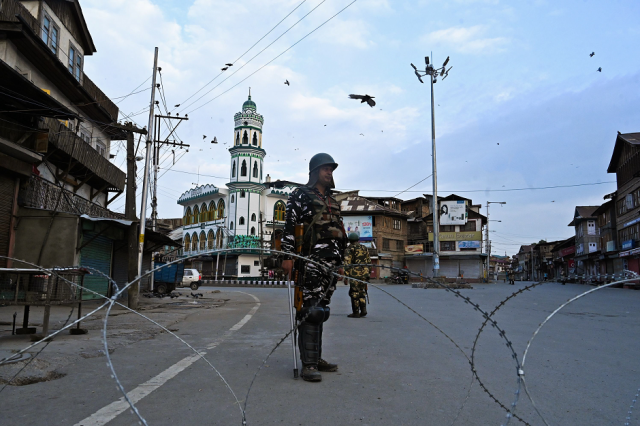Status of J&K under international law
Free, impartial plebiscite might assist both parties and the people of Kashmir in resolving the longstanding dispute

PHOTO: AFP/FILE
On January 1, 1948, India reported to the UNSC that Pakistan was “aiding invaders” who were conducting operations against “Jammu and Kashmir (J&K), a state that has acceded to the Dominion of India and is part of India”. India also gave an undertaking that, “Once the soil of the state had been cleared of the invaders and normal conditions restored, its people would be free to decide their future by the recognised democratic method of plebiscite or referendum which, in order to ensure complete impartiality, might be held under international auspices”.
Pakistan denied the allegations and furnished its view of the situation. On January 17, 1948, the UNSC “decided [that India and Pakistan] take part in direct talks … in an effort to find some common ground on which the structure of a settlement might be built”. Recognising that “an investigation is a matter of urgency”, the UNSC established a Commission for India and Pakistan. The Commission was tasked with (a) to investigate the facts pursuant to Article 34 of the UN Charter and (b) to exercise mediatory influence likely to smooth away difficulties. On April 21, 1948, the UNSC noted that “both India and Pakistan desire that the question of the accession of J&K to India or Pakistan should be decided through the democratic method of a free and impartial plebiscite”. On August 13, 1948, the Commission said that India and Pakistan “reaffirm their wish that the future status of the State of J&K shall be determined in accordance with the will of the people and to that end, agree to enter into consultations with the Commission to determine fair and equitable conditions whereby such free expression will be assured”. This agreement on free and impartial plebiscite was reaffirmed on January 10, 1948.
In a response to a political development in J&K, the UNSC affirmed “that the convening of a constituent assembly as recommended by the General Council of the ‘All Jammu and Kashmir National Conference’ and any action that assembly might attempt to take to determine the future shape and affiliation of the entire State or any part thereof would not constitute a disposition of the State in accordance with the above principle”. It was a clear warning that any action by the assembly to determine J&K’s future shape would have no effect internationally.
Ignoring the resolution, on November 17, 1956, the Constituent Assembly of J&K adopted the 1956 constitution. Article 3 states that, “the State of J&K is and shall be an integral part of the Union of India”. The UNSC responded by reaffirming “the affirmation in its resolution 91 (1951)” and declared that “any action that assembly may have taken or might attempt to take to determine the future shape and affiliation of the entire State or any part thereof, or action by the parties concerned in support of any such action by the assembly, would not constitute a disposition of the State in accordance with” the principle of free and impartial plebiscite.
Resolution 122 (1957) was adopted about two months after the adoption of the 1956 constitution. The language used i.e. “any action that assembly may have taken” was a clear indication towards the “no effect” of Article 3 of the 1956 constitution. Resolution 122 (1957) also used language indicating towards no effect of future unilateral actions i.e. “any action that assembly might attempt to take”. This “no effect” language was not specific to the J&K Assembly but equally applied to the Indian decision of repealing Article 370 of its constitution.
The Indian decision to repeal Article 370 is against the UNSCR. Furthermore, India took the matter to an international forum on January 1, 1948. Today it cannot argue that the J&K dispute is an internal Indian matter. Free and impartial plebiscite might assist both parties and the people of Kashmir in resolving the longstanding dispute preventing further violations of human rights.
Published in The Express Tribune, August 17th, 2019.
Like Opinion & Editorial on Facebook, follow @ETOpEd on Twitter to receive all updates on all our daily pieces.














COMMENTS
Comments are moderated and generally will be posted if they are on-topic and not abusive.
For more information, please see our Comments FAQ